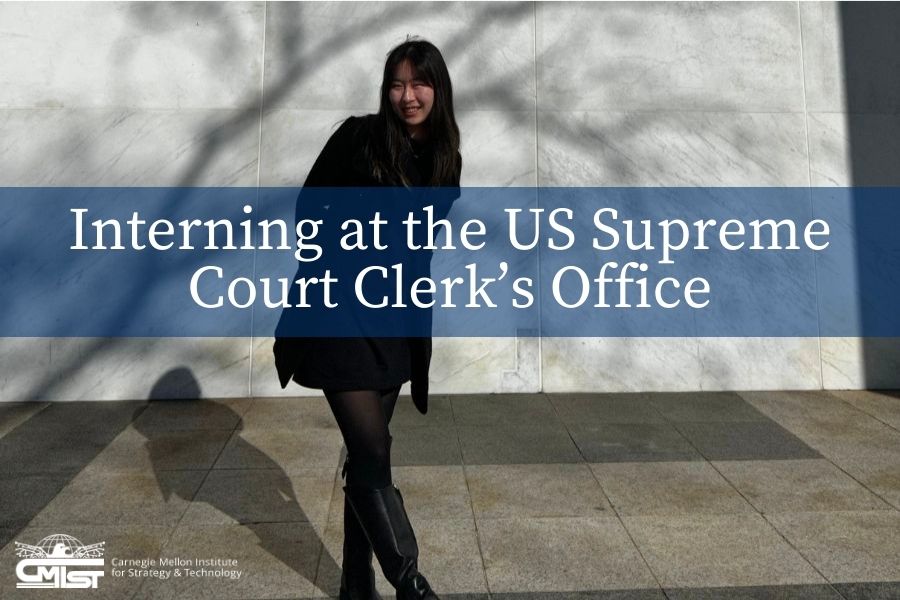
Interning at the US Supreme Court Clerk’s Office
By Lindsay Marcellus
Media Inquiries- Communications Specialist
Editor's Note: Joyce Lee, a rising junior, is pursuing a bachelor of science in international relations and politics with minors in military strategy and international relations and neuroscience. In spring 2023, she participated in the Carnegie Mellon University Washington Semester Program (CMU/WSP), an experiential learning program in which students live, intern, and take classes in Washington, D.C. This program is open to CMU undergraduates from any college or major. Each student participates in an internship, which usually involves about twenty-four hours of work a week. Below, Joyce shares about her experience interning at the US Supreme Court Clerk’s Office as well as her advice to future interns. Responses have been lightly edited for length and clarity.
What interested you about this internship?
Law has always been a path of interest for me, and when I saw that SCOTUS had an internship program, I submitted an application. I wanted to gain access to the highest establishment of my hopeful career field and a better understanding of how the US legal system functions from an inside perspective. In addition, interning at the Court would give me the unbelievable chance to be surrounded by the top practitioners of law.
What was your favorite part of the internship?
My favorite part of my internship was definitely all of the people I met! Ranging from case analysts, SCOTUS bar members, and law clerks, to the Justices themselves, I had the wonderful opportunity to speak with a variety of people involved in the process of law, listening to their life stories or opinions on current cases/events. Such conversations served to solidify my desire to work in law, and I am forever grateful for all of the connections and perspectives I gained through this internship.
What were some skills you needed to carry out your duties? What, if anything, in your experience at CMU did you find to be helpful in terms of preparation?
I definitely needed good organizational and time management skills, which CMU’s rigor prepared me quite well for. As an intern in the Clerk’s Office, I was responsible for a lot of the administrative duties, such as filing Court records and bringing briefs around for circulation. As I carried out these tasks, a lot of requests and documents often overlapped with each other, calling for quick judgment and movement.
In addition to such administrative responsibilities, I also had to have well-developed analytical skills as I organized new IFPs* or paid cases. I analyzed and took these materials on circulation, as well as helped prepare them for the oral arguments and conferences.
How did you develop professionally and personally over the course of your internship?
Professionally, I learned a lot about proper in-office behavior and dress, especially as this was my first in-person internship. By focusing on developing a professional demeanor, I had the chance to meet and network with other professionals who helped further nurture my understanding of professionalism in law.
This internship also helped me understand the importance of networking. Before this role, I had been hesitant to open up to others, especially those in higher positions and older than I. But the four months at the Court really opened up my eyes to the beauty of networking and mentoring, which included me eventually taking a trip down to Charlottesville to tour The Judge Advocate General Legal Center and School!
What advice would you share with future interns?
Take a chance and greet people. Many of my enlightening conversations with attorneys, law clerks, and Justices began with “Good morning!”
Most of these individuals have been working in their role for years longer than we have been alive, and they have cultivated and honed their wisdom and advice. Initially, I had been nervous to speak with them, as they seemed so intimidating; however, everyone I approached with a smile and a greeting was warm and inviting, asking me about my future plans and answering any questions I had. Through interactions such as these, I gained insight into how the American legal system and education functions.
*IFPs refers to Motion to Proceed in In Forma Pauperis, which is granted to individuals who are determined to not be able to pay the filing fee.
